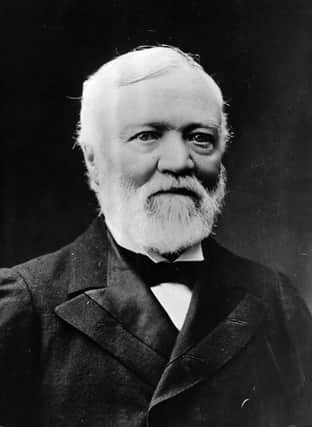Finding a common vision will bring economic success - Joanne Davidson


It is the strong foundation upon which a society can build progress, the financial engine for improvements to social justice, our environment, and our health and well being.
The issue that appears to divide our pursuit of this common aim appears to hinge on three of Carnegie’s words – “a common vision.” Recent experience would tell those of us engaged in representing businesses large and small that identifying “common vision” is a task fraught with difficulty.
Advertisement
Hide AdAdvertisement
Hide AdNot least amongst these is a current approach which is driving short-term thinking, often fuelled by political expediency, and underpinned by a multi-layered system of government riven by an absence of consistency. Think Conservative led UK Government, SNP and Green coalition Scottish Government, and Labour led coalition l city council.
We know that inconsistency and instability are the enemies of a successful economy. Then consider that in the past two years the UK has had 3 Prime Ministers, 5 Chancellors of the Exchequer; Scotland has had 2 First Ministers and two Cabinet Secretaries for Finance and the Economy; and we’re now on our second Leader of the City of Edinburgh Council.
That is why Edinburgh Chamber of Commerce has called on the Scottish Government – in fact the Scottish Parliament - to work with business to develop a Modern Industrial Strategy for Scotland which sets out long term goals for our economy and maps the way to reach them. The strategy needs to be underpinned by cross-party commitment, to remove political short-termism from the equation. Such a strategy would bring everything together, creating a cohesive, overarching and long-term aim for the development of our economy.
In early January, the Scottish Government launched a paper on a proposed Industrial Strategy for an Independent Scotland. Whilst there were some elements of the thinking here which we welcome, such as direct funding and investment for key growth areas, and the establishment of an independent industrial strategy council, we need a plan for now.
Advertisement
Hide AdAdvertisement
Hide AdWe don’t just want to talk a good game, the Chamber has also stressed that it is determined to be a valuable player in the work required to deliver such a strategy, and in fact we will be convening an assembly of business leaders to work on proposals over the coming months, to give their time and enormous expertise to developing ideas and focus for any Industrial Strategy.
The economy underpins everything that Scotland values. It provides the resource for our health service, our education, our ability to care for the youngest, oldest and most vulnerable in our society. It is important at this vital time that we make good, sustainable, thoughtful and strategic choices that will ensure the future of our economy. Such a strategy would bring everything together, creating a cohesive, over-arching plan for the development of our economy.
We face a raft of challenges - inflation, while falling, remains high; critical skills shortages; rising costs; wages inflation; and what appears to be an ever-increasing burden of legislation and regulation are hampering efforts to bring the cost of doing business crisis under control.
So how can we build an essential bridge, and create an environment in which government and business can work hand in hand to improve the outlook? We need a completely different approach to the way Government engages with business. It needs to be much earlier in the legislative process, and it needs to be much more meaningful. It needs to be focused on identifying barriers, and working together to find the best, workable solutions. This may avoid ill-conceived – though well-intentioned – policies which prove flawed and erode confidence.
Advertisement
Hide AdAdvertisement
Hide AdIn all of this we need long-term thinking to match targets, and we need that strategic thinking to be impervious to political cycles. If we continue to operate on short-term cycles, long-term progress will elude us.
Finally, we would like policy-makers to consider the real opportunity which exists to help create a commercial advantage of Scotland through a bold and innovative approach to business taxation. We want to see the iniquitous business rates system reviewed, and a modern, radical approach taken moving away from property-based to a more mixed and transactional basis. This is an area in which policy-makers could create a real point of difference between Scotland and the rest of the UK, and we urge them to consider a new approach.
Joanne Davidson, Director of Policy, Edinburgh Chamber of Commerce
Comment Guidelines
National World encourages reader discussion on our stories. User feedback, insights and back-and-forth exchanges add a rich layer of context to reporting. Please review our Community Guidelines before commenting.